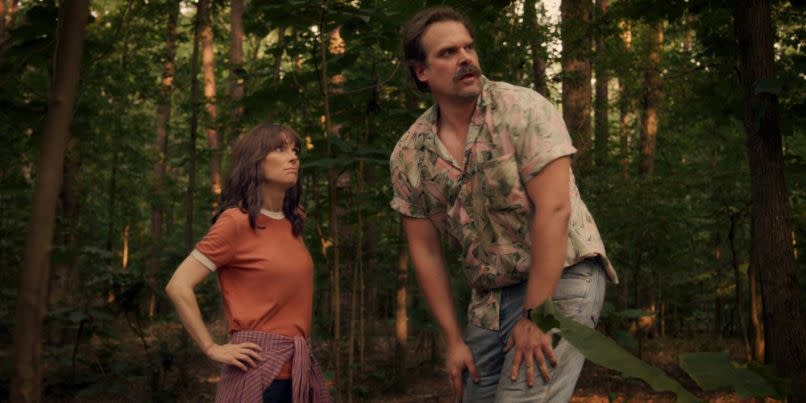Stranger Things Composers on How Themes Grow Up and Scoring Season Three’s Tearful Ending
Kyle Dixon and Michael Stein aren’t just regulars of Hawkins, Indiana; they’re statesmen. The two founding members of Austin’s S U R V I V E are an essential pillar of Netflix’s Stranger Things, having scored the Duffer brothers’ nostalgic dreams since 2016.
Their Grammy-winning theme song is more ubiquitous than the series itself. In addition to being the first true-blue theme song for TV’s streaming era, it’s since transcended the show to become the de facto anthem for all things spooky in pop culture.
(TV Review: Stranger Things 3 Is Peak Blockbuster Television)
Beyond the theme, though, Dixon and Stein add so much life to the series. Think back to that debut season, when the AV Club first stumbles upon Eleven in the rain, or when Bob tragically bites the dust in Season Two, and you can probably hear the themes right now.
All of that emotional gravitas is back for Stranger Things 3, only this time they’re having to contend with the season’s themes of change and growth. In our exhaustive interview with the two composers, they discussed how those challenges affected their approach.

Stranger Things (Netflix)
You’ve called this a “standalone record.”
Kyle Dixon: Well, I think what we meant by that statement is that we were trying to make a release that felt more like an album than a score. So, we omitted a lot of stuff from the show — stuff that helps tell the story and that’s still interesting to us, but doesn’t necessarily play well on a record without picture accompanying it.
You know, one of those things that you have to do when you’re scoring that can be jarring or just bizarre if you’re just listening without any visual accompanying it. So, I think that’s what we meant by that. We were trying to just choose and curate things that were more in the space.
Michael Stein: Sometimes things either don’t even feel like they have a resolve or beginning, so it’s easy to cut those. Others are like 30 seconds long, and even if they do have a conclusive beginning and end, it can feel like a bumper or something. It just doesn’t feel like a composition that you would listen to out of context.
What prompted that focus for this season’s release?
Stein: It kind of just happened on its own
Dixon: I guess it’s not particularly unique to this season. It’s not like we made a lot more music this season than we did on the previous one. Whether or not that’s true, I’m not a hundred percent sure of.
[youtube https://www.youtube.com/watch?v=-2p0mRpTAa0?version=3&rel=1&fs=1&autohide=2&showsearch=0&showinfo=1&iv_load_policy=1&wmode=transparent&w=806&h=454]
You have 41 tracks here. That’s pretty epic.
Dixon: Yeah, part of it’s that some of the pieces of music that feel more substantial are still maybe two minutes long, which is pretty short for a song. So, that’s kinda bizarre. We have all these pieces that are like 37 seconds.
Stein: We also omitted a lot of pieces [from the record] that were like action music or does its job specifically in the show. We wrote a lot of stuff that was action music or comedy music. It’s just stuff we felt we didn’t want to put on the record, because they don’t necessarily represent a listening experience the way we want.
Do you ever add to the releases? Stuff that might not have made it to the show, or maybe fuller tracks that might’ve not actually been in the scenes?
Stein: A little bit of both.
Dixon: Yeah, it’s a little bit of both. I think every release probably has some version of the song that is probably longer than what you hear in the show. In some cases this year we had more time to edit things together, make them a little longer, add details…
Stein: Like after we were done writing.
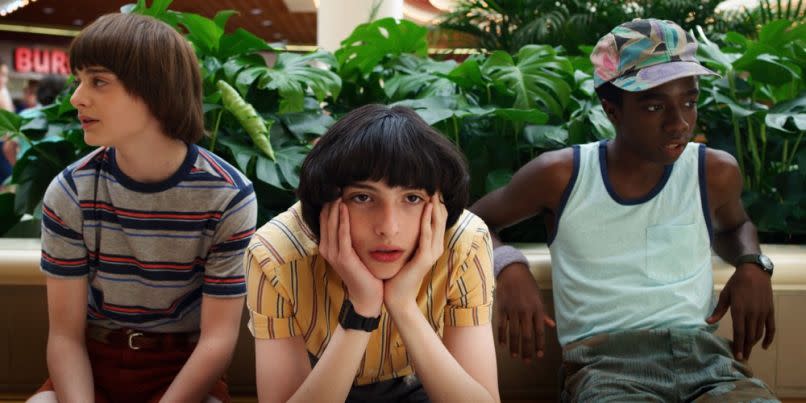
Stranger Things (Netflix)
Dixon: After we were actually done with the show, whereas, other times it was more that we finished and it was super rushed to get everything out the door and ready to be released.
Stein: Yeah, like, here’s a good vision. We asked the label, “When is it due?” and they said, “Two weeks ago.” And you think, Oh, shit.
You score to screen, right? They put in stock music at first, right?
Dixon: Not all of it. For some types of scenes, they put in other music that isn’t ours for temp, which we then have to go back and interpret. That’s to figure out what they do like about it, or gauge the feeling they were trying to go for. It’s usually the pace of the sound or how big it is, or where it grows, and ultimately the level of intensity it gets to.
Stein: It’s probably a compliment that they’re like, “You know, we look for stuff that’s just totally electronic or is something that you guys can follow,” because it’s more of what we want as a result. But they also often have trouble finding what they’re looking for to tell the narrative, so we get a lot of stuff that’s a sonically different style of music that we then go and flip to make our own.
Stranger Things (Netflix)
Season Three is bigger and hotter. Did that change how you approached the score?
Dixon: This wasn’t a conscious thing, but I became aware of it… This anecdote really doesn’t have anything to do with music, but I’m going to tell it anyway.
Please…
Dixon: The season takes place around the Fourth of July, which is a very American holiday. A lot of times when we were working on the score, I found myself wearing like white shoes, blue pants, and a red jacket. I couldn’t help but notice it this one time and thought to myself, Oh shit, okay–I guess I’m in the spirit.
It definitely has a summer-vibe, the kids are twice the size they were in the previous season. It’s just insane how much they’ve grown. So yeah, now they’re dealing with summer love kinda stuff, you know, and growing up which I think is what it’s always been about.

Stranger Things (Netflix)
Every season is arguably a coming-of-age story, but especially this season. Do you ever draw from your own childhood experiences while scoring?
Stein: I have big memories of growing up in Texas and the summers there. We grew up in the era that they’re sort of recreating. We probably remember our teen years in the ‘90s more so than the ‘80s, but it’s still the sentiment of riding bikes and traits like that.
Dixon: Yeah, I used to go hang out at the mall. That was the thing to do.
Stein: Oh, I used to hang out at the mall for sure.
Dixon: Or go to the movies and just hang out at the movie theater. I don’t think kids do that nowadays. I don’t think they get dropped off at the mall and just hang out there all day while your parents are at work. I don’t know what you do now because I’m not a kid anymore [laughs], but I’m pretty sure that isn’t the thing to do like it used to be.
[youtube https://www.youtube.com/watch?v=DZeVp5YIlVg?version=3&rel=1&fs=1&autohide=2&showsearch=0&showinfo=1&iv_load_policy=1&wmode=transparent&w=806&h=454]
“Starcourt” really captures that old-school magic of the mall with its New Wave beat. In a recent interview with Vice, you discussed how hard you strive not to lean too hard into 80’s cheese. Is this a good example of that exercise?
Dixon: That one is definitely the closest. So, that segment, it had temp music in it, and I’m using air quotes here, but it was much more of a “synth-wave” track that was very, you know, you got the laser grids and the palm trees… It was very much like that at first.
So, we knew that the score needed to have that much energy or sentiment, but we didn’t want to go as straightforward as that. One of the things that a lot of early synthpop did that we liked is how they play into this idea of love and fun like old doo-wop songs.
The Crystals or Phil Spector kind of stuff has that feeling.
Stein: It has that melancholy that we like to try and write into the tracks, where it’s a good mood feeling, but you still have the very sentimental quality that’s not sad, but has the strings, you know?
It’s got the angst.
Stein: Exactly.
[youtube https://www.youtube.com/watch?v=5HI_xFQWiYU?version=3&rel=1&fs=1&autohide=2&showsearch=0&showinfo=1&iv_load_policy=1&wmode=transparent&w=806&h=454]
It’s about one vocal track away from being a When In Rome track. Did either of you try and sing over it just for fun?
Dixon: [Laughs.] No, I didn’t.
Stein: [Laughs.] I don’t really sing well.
Dixon: Yeah, it’s kind of begging for vocals, but we didn’t actually do that just because we knew we didn’t need that.
Stein: It’s actually a little intimidating. One of the first mall scenes had [Phil Collin’s] “Sussudio” as temp–which is a big, big track with active drums, inspired by soul and funk and all that. I saw a comment that said something like, “Oh they really missed the mark, they didn’t use the big ‘80s gated reverb drums,” and I thought, Well no, we’re going for Big Room–Phil Spector–Big Room with synths, it’s more wall-of-sound. We didn’t want to be like, “Here’s an ‘80s song. It sounds like the ‘80s!”
[youtube https://www.youtube.com/watch?v=r0qBaBb1Y-U?version=3&rel=1&fs=1&autohide=2&showsearch=0&showinfo=1&iv_load_policy=1&wmode=transparent&w=806&h=454]
Speaking of pop, this season is surprisingly front loaded with pop songs and not so much in the back half. Why do you think that was?
Dixon: It’s about introducing the summer vibe and saying, “Remember, there’s this fun summer situation going on,” and pop songs work that way.
Stein: They’re highlighting the fun element and some of the comedic stuff probably to balance out the amount of terrifying stuff.
We were shocked at some of the crazy, body-horror in there. It gets pretty dark.
Dixon: I know! If you stop and think about what’s actually going on with that you’re like, “Whoa.”
[youtube https://www.youtube.com/watch?v=OXt20GT72AE?version=3&rel=1&fs=1&autohide=2&showsearch=0&showinfo=1&iv_load_policy=1&wmode=transparent&w=806&h=454]
You two follow them right into that darkness, too. “Six Facts” sounds like Penserecki off of The Shining and “Rats” is like that twisted transmission from Event Horizon. How dark were you told to go and how much of it was your own instinct?
Dixon: I think we were always pretty excited to get to go dark. Like, what is the most twisted thing that we could get away with doing in a very popular TV show that children are going to be watching. It’s fun to me to expose kids to basically noise music, in a way. [Laughs.] They don’t realize it, they’re just watching the show.
Stein: When you’re working and you come across something that’s like “Oo that makes me feel uncomfortable,” I’m probably a little more desensitized to what sounds are uncomfortable, so, if I’m making myself feel uncomfortable then it’s probably going to be really effective to someone who listens to stuff that’s nothing like that.
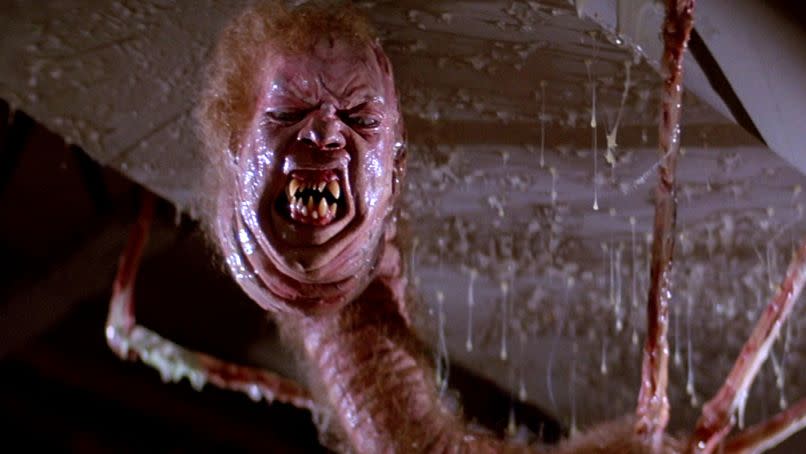
Do you ever revisit any of the pop culture influences that the Duffers have from season-to-season? This season they pointed to John Carpenter’s The Thing, David Cronenberg, and even George A. Romero.
Dixon: We didn’t really have time to. We went back and watched a handful of movies, but I wouldn’t say we studied.
Have you done that in the past?
Stein: The first season I watched some television — Twin Peaks and things — to see how shows I liked were using scores. Twin Peaks uses it in a way that is more of the soap opera effect, whereas Stranger Things doesn’t really do that. I also wanted to know the feeling of nostalgia the first season was going for.
Dixon: In the first season, I remember the references to E.T. and Stand By Me, so in that case, I did go back and check those scores out. I was actually surprised by the E.T. score. Not the epic flight over the moon scene, but the general underscore in that movie. I was just shocked at what they were doing.
[youtube https://www.youtube.com/watch?v=X2lkvrMa27c?version=3&rel=1&fs=1&autohide=2&showsearch=0&showinfo=1&iv_load_policy=1&wmode=transparent&w=806&h=454]
Stein: Also, up until that point, we weren’t like actively dissecting a movie’s score until we were doing it for this specifically. You go back and you think, I don’t even remember it that way.
You tend to revisit a lot of themes in various places. How do you decide which are the core themes and do you ever reverse-engineer any past themes into something new?
Dixon: Every season, we think we’re going to do more of that than we actually do or we think we’re going to focus on certain pieces more than we actually do. But “Rats” is a reprised, way different version of “The Upside Down” from the first season, and there’s a handful of different examples of that. But a lot of the cute stuff that was in the first season was just not really applicable anymore. The kids have grown up and they’re dealing with different types of emotions. So, there’s not as much cutesy stuff.
[youtube https://www.youtube.com/watch?v=u9J7ev1j_yA?version=3&rel=1&fs=1&autohide=2&showsearch=0&showinfo=1&iv_load_policy=1&wmode=transparent&w=806&h=454]
Stein: For example, the introduction to Eleven’s theme, if you think back to the first time you met her, she was just discovering the world and was essentially a baby. The theme mirrors that and in Season Two, we played it a little slower.
Dixon: And in Season Two, that same score was mainly used as a memory, because she can talk now. She’s not that person and only reverts to that person in flashbacks of memories.
There are so many teams and character pairs in Stranger Things. Who do you like to score the most?
Dixon: What can we say here that won’t spoil anything? I don’t want to give too much away.
Stein: For me, I thought Billy can be an asshole and I was like, “Oh, I’m excited to do some stuff for Billy this year,” but we ended up not going in the direction we thought as much as we intended.
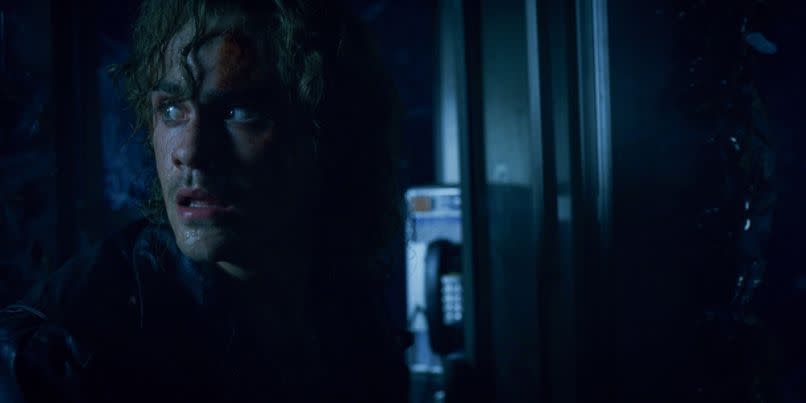
Stranger Things (Netflix)
Dixon: I like the Scoop’s Troop as a dynamic. I don’t know if they were necessarily my favorite to score, but just generally in the show.
Stein: They’re just fun and they’re funny. Their reaction sound was much more synth-driven and always had a fun, energetic feel. Whereas if Hopper is kicking ass, it’s more big drums and more of a heroic feeling.
This season ends with one a few major bombshells. How do you treat these moments differently? More specifically, how did you discover “Aftermath” and did you at all work back from “Eulogy”?
Stein: That one is very interesting. There’s a few that tie in. We would try and predict how we would do a scene… I’ll lay it out like this: We would have “Sauna Test”, that was the leadup to this epic finale song that we only knew of by the directors telling us, “This is going to happen,” but we had no idea what the scene was going to be. So, we had this B-side to “Sauna Test” that was supposed to be more or less what “Aftermath” was going to be. But when we got to “Aftermath” in episode eight — because we don’t see anything until it’s linear — we realized, “Oh, this isn’t going to work.”
[youtube https://www.youtube.com/watch?v=pU-n3DxRO44?version=3&rel=1&fs=1&autohide=2&showsearch=0&showinfo=1&iv_load_policy=1&wmode=transparent&w=806&h=454]
Dixon: Some things just don’t work, because we go into this not having seen anything. You can guess, but most of the time, your guess is going to be wrong.
Stein: “Aftermath” just came about with trying to solve that scene and what the feeling of it was. It was way more somber.
Dixon: We do use a similar sound to the main lead in “Eulogy”.
Stein: It has choral element to it and a vocal line.
We got the score prior to the second season in 2017, and I remember hearing “Eulogy” and saying, ‘Holy shit, this is the best Bon Iver track I’ve heard in over half a decade.”
Dixon: [Laughs] So, you heard the score before you saw the show?
[youtube https://www.youtube.com/watch?v=TQSNjdllHlE?version=3&rel=1&fs=1&autohide=2&showsearch=0&showinfo=1&iv_load_policy=1&start=8&wmode=transparent&w=806&h=454]
Yes, and I just remember thinking I couldn’t wait to hear where this was going to show up.
Dixon: I don’t want to say too much, but this season is going to be a lot.
Let’s just say, my girlfriend and I had to wear sunglasses because of the tears.
Dixon: I just can’t wait to see the reactions of everyone.
Stein: One thing that’s challenging with scoring and trying to predict music that will accompany a scene or what’s going to go on the O.S.T is that once we’re on episode eight, we’re writing the O.S.T. and trying to get it done on time to release when the show comes out. One of our poppiest and saddest songs just didn’t make the show, it got replaced with something else.
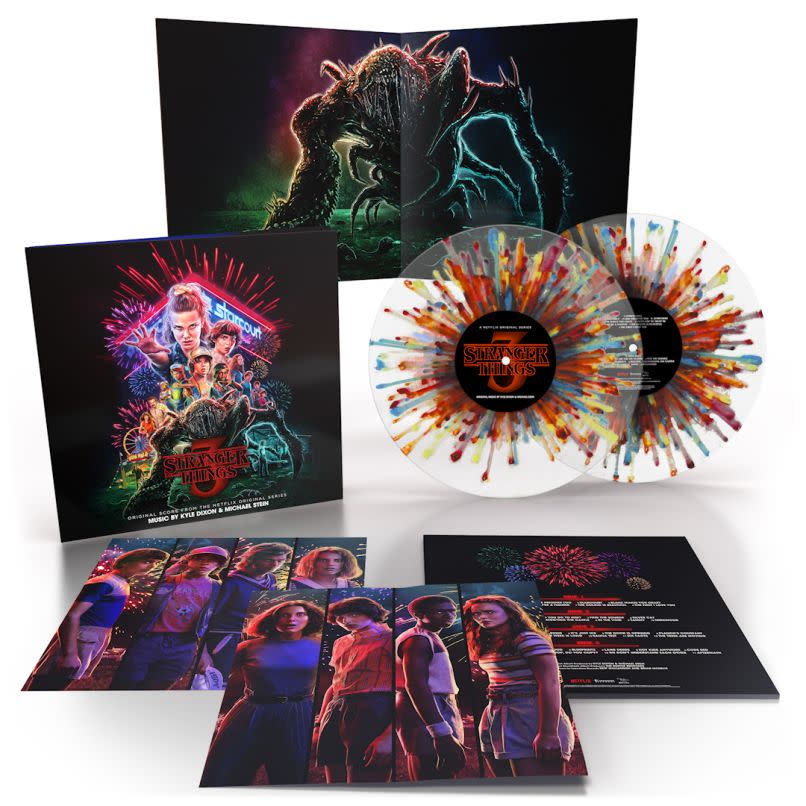
“Fireworks Splatter”
(Giveaway: Win a copy of Stranger Things 3 on vinyl now!)
You’re tasked to write off-season as well, so I have to imagine you have just stocked tons of recordings.
Stein: Well, we’ve been busy between these last two seasons. But that’s just writing music in general, you rack up a catalogue and you think, Well, this doesn’t work for this project, but maybe it’ll work for this one later, so you just keep it in your stock and come back to it. Maybe.
Dixon: It’s like we have all this music, we just haven’t figured out where it all fits just yet.
Do you think you’re going to release another volume for this season or is this one it?
Dixon: This is probably it. I have an idea that’ll I’ll just allude to that isn’t for certain just yet, but there is potential for some other something.
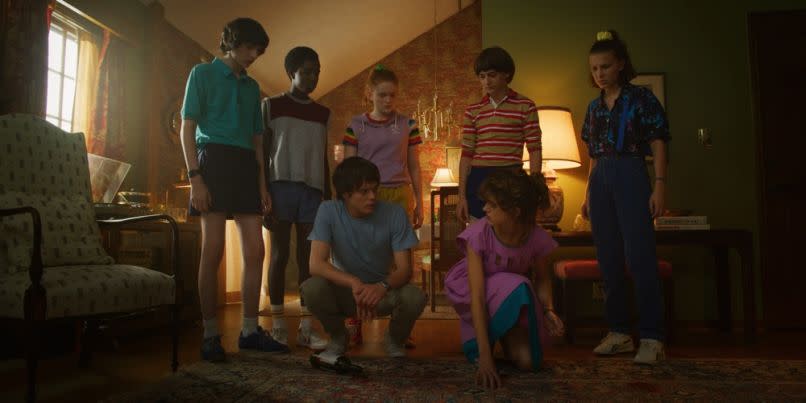
Stranger Things 3 (Netflix)
Is there any plan to tour again?
Stein: We have one show booked for now, or a couple, it changes, but I’m sure, as always the case, once the show’s out, we’ll be asked to do more.
Three years later, the theme of Stranger Things is a major part of pop culture now. How does that feel? How has that changed your own life?
Dixon: I mean, it doesn’t feel bad.
It’s still just a little bit of a surprise. When we got to the version we sent over as a demo, we were very confident that it should be the theme of the show, because we felt that it worked very well. I’m glad that everyone else did, too.
My parents sent me a birthday card — I think it was birthday card, it was some holiday–and basically you open it up and it had the string of lights and then it plays the theme song…

Stranger Things 3 (Netflix)
That has to be strange, no pun intended.
Dixon: It is! I thought, This is so weird. It’s like they’re at Walgreens or whatever, and then they think they’re just looking for a birthday card for me … and then they found that
Stein: It’s like, “What do you think? Is this the one we should get?”
How has it influenced or affected Survive?
Dixon: Well, we definitely learned a lot of techniques that may or may not be applicable to Survive records. But we’ve also been getting equipment that’s helping us work on these shows and movies and whatnot, so some of that I’m sure will get pulled into the new Survive stuff, which we’re finally, after this long year, starting back up and finishing. The next album that we started over a year ago, it’s come far along, but it’s not done.
But we’re finally getting back to that, and it’s actually feeling really nice to “work on something for yourself.” I mean [Stranger Things] made it possible for us to reach out to certain people and ask for things that we couldn’t have done before, which is nice, and it’s allowed us to make a living off of music, which was not the case for most of Survive’s existence, which is a positive thing.

Stein: I don’t think it’s changed too much, though, as far as an influence necessarily, to our music with Survive. It’s nice to go back and revisit the sounds that were evolving as we were growing, because when Stranger Things came about, that all sort of fractured off.
It’s nice to come back to that road and keep exploring, back to writing darker, more headier songs that’s somewhat, hopefully, catchy. Survive has its own very specific sound. It used to be that each of us would make like a thousand songs and a few of these can be Survive songs and some can be for another project.
Will we be seeing a new Survive record this year?
Stein: We’re hoping.
Dixon: You won’t see it this year, it’ll be next year, but we hope to have it done this year.
Stranger Things Composers on How Themes Grow Up and Scoring Season Three’s Tearful Ending
Michael Roffman
